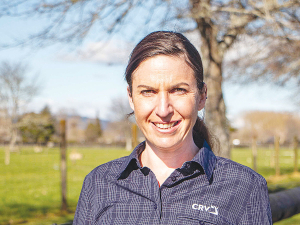The Waikato region is currently experiencing a concerning surge in Bovine Viral Diarrhea (BVD) cases within dairy herds, with the highly contagious disease potentially causing significant economic losses for farmers, according to vet and CRV national sales and marketing manager Julia Baynes.
Bulk milk testing, conducted by herd improvement companies before the mating season to assess herd health, has revealed a significantly higher number of Waikato herds testing positive for the BVD virus compared to the previous season.
Baynes says while typically only two or three herds test positive each year, this year, the number has risen into the tens within Waikato. This is particularly alarming considering The Ministry for Primary Industries' figures show widespread BVD costs New Zealand farmers an estimated $150 million annually.
"With dairy farmers already grappling with a challenging economic environment, the last thing they need is a BVD outbreak," she says.
"Given that in most cases, last season's milk tests from affected farms did not identify any BVD virus, it is likely that the virus has been introduced to herds since the last testing cycle. Therefore, farmers must remain vigilant, especially as bulls are brought onto the farm for mating."
BVD can result in embryonic loss in cows, leading to increased empty rates and significant financial losses for farmers. It can also lead to the birth of more persistently infected (PI) calves if not managed correctly, exacerbating the problem.
PI animals, especially heifers, are the primary carriers of BVD. These animals were exposed to the virus during fetal development in the first two trimesters. If they survive to birth, they harbour a persistent infection until they join the milking herd.
In the current economic climate, Julia acknowledges the temptation to reduce testing for diseases like BVD to save costs. However, the potential devastation it can cause is reason enough to maintain testing.
PI animals do not always exhibit classic BVD signs, such as poor growth and a scruffy appearance. In many cases, they appear healthy, making it challenging to identify the based on outward appearance alone.
"The consequences of a BVD outbreak during mating season can be devastating for farms, and it's not always the scruffy-looking calves, heifers, or cows," says Julie. "BVD can be a silent weapon. It's not until cows are cycling well and farmers start experiencing a surge in returns from aborted foetuses that they realise something is amiss."
Farmers are strongly encouraged to follow best practices to mitigate the risk of BVD, including annual bulk milk testing, ear notching of calves, and vaccination. Monitoring herds for early signs of the disease is crucial since early detection can prevent the virus from spreading.
"Ear notching for calves is an effective way to test for the presence of the virus at a young age," says Julia. "This enables farmers to identify and remove PI animals from the herd as quickly as possible and prevent further spread of the disease."
Vaccination is another crucial tool in the fight against BVD. It provides protection for young stock and reduces the risk of infection during the critical period when heifers are most vulnerable, and a further premating shot can give 6 months of protection to the foetus. To further safeguard the herd, it is important to ensure that any bulls brought into the herd are tested for BVD and vaccinated.
“Farmers should maintain strict biosecurity measures to prevent the introduction of the virus from external sources, particularly through bulls brought onto the farm for mating.”
For more information about BVD and best prevention practices, farmers are encouraged to consult with their local veterinarians.











